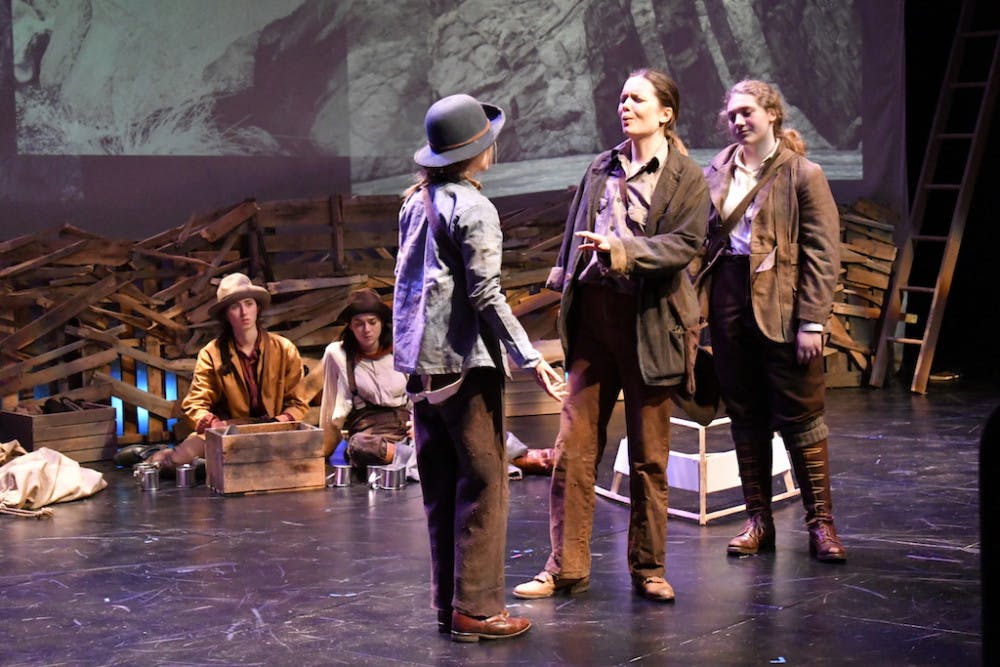“Men on Boats,” written by Jaclyn Backhaus, is the topsy-turvy tale of explorer John Powell and his zany crew as they chart the undiscovered territory of the American West. Based on Powell’s recording of the expedition, the play stays true to history in all ways but one — Powell and his crewmen are all played by female actors.
The young actors take the stage with all the bravado of the Anglo-Saxon men they play, jutting their hips out and broadening their shoulders. The virility they demonstrate is well-complemented by the muted yellows and browns of their costumes, their chapped leather cowboy boots and worn suspenders. Like many other old men, these explorers do not prioritize fashion.
Lead actress Katie Marshall ’21 gives a convincing performance as Chief Powell, the crew’s one-armed commander. Her face is never vacant, always brewing with thought or vigor beneath its surface. Her portrayal of Powell as a reflective, passionate captain centers her team. As Powell, she is able to obliterate all the insecurities of her increasingly worried crew.
Powell’s relationship to her team, specifically to Dunn, played by Madeline Ciocci ’20, is a major highlight of the show. The dynamic between the two of them is complicated but quirky, quickly transitioning from them tenderly naming cliffs at sunset to hotly debating the leadership of the expedition. Dunn has no qualms about expressing that he could lead the team more efficiently. Despite these tensions and a few small tantrums, the two still bond like brothers, parting ways with the grief and concern specifically reserved for loved ones.
The play is a first of its kind, written for 10 21st-century female actors to play 10 male colonizers. Backhaus, in an interview with Playwrights Horizons, an Off-Broadway theater company based in New York, said her inspiration for writing the show was to see “a show with characters I’d never get to play herself.” In a country where the majority of stories are told by and reserved for cisgender white men, Backhaus wanted to stir up change.
Middlebury’s production succeeds partially in accomplishing Backhaus’ goal. In her interview, Backhaus put an emphasis on racial diversity as well as gender diversity, which seemed to be lacking in the college’s production. It could be due to the school’s demographics, but is no less disconcerting.
This is not to say the show “failed” or should be discarded in any regard. It was an enjoyable 100 minutes filled with camaraderie and anticipation. It was humorous and knew how to hit its satirical moments. In one scene, Powell seeks the help of Native American chief Tsauwiat, played by Coralie Tyler ’20. In a conversation between the two, Powell slows and exaggerates his speech to be understood by the perfectly-fluent Tsauwiat. Tsauwiat is less than impressed by this and the audience laughs alongside him in looking down on the European conquestors.
Overall, “Men on Boats” was a theater experience worth having. Its quick-as-a-whip dialogue critiquing imperial conquest and its light-hearted approach to toxic masculinity work together to give us a chance to laugh at typically noxious American history — a rather difficult feat. For the young female actors who got to explore the wild, wild Anglo-Saxon West, the experience was beyond satisfactory.
“I think it’s very interesting politically to put traditionally non-male bodies in a story of conquest,” said Becca Berlind ’21 who played navigator Andrew Hall. “Because the script is trying to do that, it’s shaped a little bit differently, just discovering those moments was really fun.”
Comments




